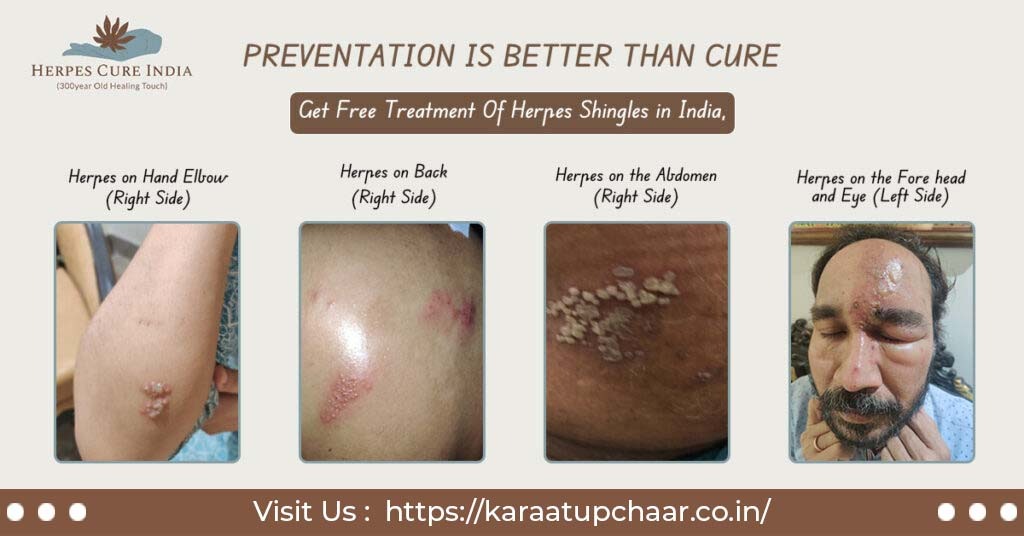
Herpes Cure – Get Effective Treatment of Herpes Shingles in India
The primary goals of the treatment of Herpes are to relieve pain, promote rapid healing, and prevent complications. Starting antiviral treatment as soon as herpes is detected can reduce the risk of postherpetic neuralgia. Corticosteroids can help control pain and outbreaks, while other components of treatment include patient isolation and curative care of skin lesions to prevent nosocomial infection.
Antiviral Agents for the Treatment of Herpes
Antiviral medications such as acyclovir, famciclovir, and valacyclovir are commonly used in the treatment of Herpes. These drugs alleviate pain, speed up recovery, and prevent postherpetic neuralgia. Antiviral therapy should be initiated within 72 hours of the rash onset. Studies have shown that famciclovir may be more effective than valacyclovir in reducing the discomfort of acute herpes zoster. For instance, after 34 days on a 7-day famciclovir regimen, there was an early reduction in discomfort. Additionally, research has indicated that oral acyclovir and valacyclovir are not associated with a higher incidence of acute renal impairment compared to famciclovir.
Systemic Corticosteroids in the Treatment of Herpes
In certain cases, such as acute zoster pain, Ramsay Hunt syndrome, and ocular sequelae, corticosteroid therapy is recommended. Corticosteroid therapy is more effective when combined with antiviral drugs. The combination of acyclovir and corticosteroids has shown significant efficacy in the treatment of Herpes zoster in both adults and children. Early therapy with this combination also enhances hearing recovery.
For example, combining acyclovir and steroids to treat Ramsay Hunt syndrome has been shown to improve facial nerve function. Additionally, acyclovir and prednisolone treatment for herpes in people over 50 can improve their quality of life. While acyclovir and prednisolone may alleviate the rash and acute symptoms of herpes zoster, their long-term effectiveness in preventing post herpes neuralgia remains uncertain.
Effective Treatment of Herpes during Pregnancy
Herpes zoster can be treated during pregnancy with acyclovir or valacyclovir. In early pregnancy, acyclovir is considered the drug of choice (DOC) as it does not increase the risk of birth defects or preterm birth.
For instance, a 28-week pregnant woman treated with acyclovir and acetaminophen for herpes zoster neuralgia gave birth to a healthy child two months later. Another case involved a 17-week pregnant woman who responded well to valacyclovir during her Treatment of Herpes zoster.
Newborns whose mothers have varicella or herpes zoster between 5 days before and 2 days after giving birth should receive varicella-zoster immune globulin, even if the mother has had these conditions before.
Natural Home Remedies for the Treatment of Herpes
Essential Oils
Essential oils have been used for many decades for their therapeutic benefits, particularly for skin conditions. Certain essential oils contain compounds that may aid in skin healing and reduce inflammation, making them effective in the Treatment of Herpes. Some beneficial oils include:
- Chamomile essential oil
- Eucalyptus essential oil
- Tea tree essential oil
It is important to note that pure essential oils may cause allergic reactions in some individuals. Therefore, always perform a patch test before use. It’s also best to mix essential oils with a carrier oil or obtain a safe topical ointment from a pharmacy.
Cold Compresses
Applying cold compresses to the affected area can help relieve irritation and reduce swelling during the Treatment of Herpes. Soak a natural cotton cloth or towel in cold water, wring it out, and apply it to the sore, itchy areas. Repeat as necessary. It is advisable to avoid exposing the skin to extreme temperatures, such as hot showers or baths, to prevent further irritation.
Balanced Diet
A balanced diet rich in immune-boosting nutrients is essential in the treatment of Herpes. Consuming foods that are orange, red, or green, which contain carotenoids like lycopene, lutein, zeaxanthin, and provitamin A, can support immune function. Examples of such foods include:
- Orange foods: Carrots, pumpkins, and apricots.
- Red foods: Watermelon, red peppers, grapefruit, and cherries.
- Green foods: Kale, parsley, spinach, melon, lettuce, and endive.
Karaatupchaar: Expert Guidance for the Treatment of Herpes
Karaatupchaar provides a Medical Expert Board of board-certified physicians to review our articles and join us in our mission to make you confident in your health decisions. We offer free treatment of Herpes and empower you with the best answers to your most pressing questions, from understanding herpes virus infection diseases to managing new diagnoses and everything in between.
For more information or to seek treatment, please contact us:
Call Us:
Raj Dulari (Hargovind Chahcha) – 9954064243
Manoj Agarwal / Sushil Agarwal (Son) – 9435115363 / 9435015362
Kamal Agarwal (Hargovind Chahcha) – 9013289821

